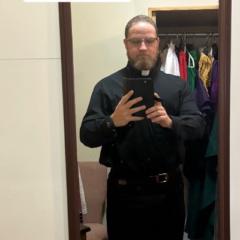Activity
Mon
Wed
Fri
Sun
Feb
Mar
Apr
May
Jun
Jul
Aug
Sep
Oct
Nov
Dec
Jan
What is this?
Less
More
Memberships
Saints John and James Parish
85 members • Free
Ephesians 6 Ministry
64 members • Free
7 contributions to Ephesians 6 Ministry
Good Morning friends!
Here is a little morning prayer for you! Taken from St. Ignatius of Loyola. Take Lord, and receive all my liberty, my memory, my understanding, and my entire will, all that I have and possess. Thou hast given all to me. To Thee, O lord, I return it. All is Thine, dispose of it wholly according to Thy will. Give me Thy love and thy grace, for this is sufficient for me. Amen!
1 Peter 3:15
Always be ready to give a reason for your hope! My friends, I want to hear ONE blessing that you have received from God today! Will you share it?
Poll
10 members have voted
THE RESULTS ARE IN
Hi EVERYBODY! I am so pumped about how the first challenge went! YOU SHOWED UP! Here’s just a few thoughts about what this challenge was about: 1. ) We grow together when we witness together. 2.) Sharing in the community is how we become PART of the community. That is, communities are built by the people who are intentional in it! The more we share with one another, the more we can grow as a community to build each other up. 3.) The challenge was meant to encourage us living a well-ordered life. Having a morning routine, getting some exercise, having a daily prayer regimen with some personal reflections are the first building blocks of a life of faith. Faith is lived, and then it is shared. AND YOU DID IT. So here are the results: @Elsa Lopez gave a strong showing with 11 points toward her wake up routine, 7 points sharing her rosary, 5 points towards exercise posts and one point for the reflection! Total 24 points! Great job! @Elizabeth Wright came in SECOND with 14 points towards her wake up routine, 12 points with rosary updates, 6 points sharing her walks and 11 points for her reflections! Total: 43 points! Great job! But… the winner with 46 points ( it was so close!!!) was @Mack Clair . Mack earned 17 points waking up multiple times before 6am. Shared his daily rosary for 11 points, 9 points for exercise and 9 points for his prayer reflections! In truth, all three of you have earned something for your efforts, so… I have a prize for each of you! @Elizabeth Wright and @Elsa Lopez — I have a rosary for you! @Mack Clair you are now the proud owner of Fr. Carlos Martins’ book, The Exorcist Files! Congratulations! Let’s go! Message me for how to receive your prizes!
Poll
5 members have voted

Faith VII
Faith is PERSONAL. In Latin, the first word of the Creed is “CREDO” which is the verb, “to believe” in the first person singular. The first two words of the creed are “I believe.” Someone once said that if one cannot share their personal faith with Jesus and can only cite theological facts and figures, then they are not sharing their faith, but rather the faith of another. Faith is not meant to be a semblance of facts and figures, theological insights that can be delivered from a pulpit or at a round-table debate. Faith is a lived, personal encounter between God and His beloved, the believer. This is why we each must profess the faith on our own. Faith is a relationship with God that needs to be nurtured by each believer through their own witness and life. That is why the act of faith is so potent: it binds that person to live according to those same tenants. A believer is only as good as their witness. Hypocrisy, remember, cuts to the core of the faith, because it shows an inconsistency between the believer and what they believe. It is no small thing to profess a creed, because of what that creed personally demands of the believer. That’s why St. Paul candidly says, “What good is it, my brothers, if someone says he has faith but does not have works? Can that faith save him? IF a brother or sister has nothing to wear and has no food for the day, and one of you says to them, “Go in peace, keep warm, and eat well,” but do not give them the necessities of the body, what good is it? So also faith of itself, if it does not have works, is dead.” We also know that one can only be responsible for their own actions. That’s why it is up to each member of the community of believers to act in accordance with their faith, for faith is personal, and requires personal action. But, we are not alone! Notice, too, that God calls believers together. We stand together as a community of witnesses who, each in our own way, provide perspective in the life of faith. In each, God has presented Himself, and the life of faith is utterly personal, while at the same time, we believe together, strengthened by our community of believers.
Woe to complacency!
Woe to the Complacent.” After this admonition it goes to describe what complacency looks like. They drink lavishly, they stretch comfortably on their couches, they eat lambs, and improvise music…they are enjoying the good life, and in the good life, they have found their comfort. They grow complacent in their comfort. To them, God offers this warning, “Woe.” What is the object of a good life? That’s the question at the heart of today’s readings… What is the aim of a good life? For the complacent — it is time. The wealthy want more of it, they want to savor it, they want to prolong it as much as they can. They want the pleasures of life to last. They want to throw luxurious parties, and spend their waking days basking in their own comfort and glory. But, when the day comes to an end, when their time has come, they will have already received their reward. The Gospel offers a similar warning: Jesus offers the parable of the rich man who enjoys the fruits of a good life while the beggar, Lazarus, suffers outside. The rich man was dressed in fine linen, dined sumptuously, enjoyed the comfortable life, while poor Lazarus starved with dogs licking his sores. At the end, they end up in opposite circumstances and we can hear underneath a similar warning: “Woe to the complacent in Zion.” One of the lessons offered today is to remember that life has an aim: an aim to live well in love. Victor Frankl said it best when he wrote, “The salvation of man is through love and in love.” In other words, we were not made by God to simply enjoy our own independence free from worries. We were made for communion, we were made for love. Frankl’s point was simple: contemplation of our beloved can be the sweet refuge we find even in the worst misery, and if love is our refuge in misery, then salvation comes from love, in love. Love moves the heart beyond its own circumstances into a shared life. We were made in God’s image, to love, and it is through love that we, men and women broken by sin, are saved. As we come closer to our Savior in love, we also see that God inspires us to love: “Love one another, as I have loved you”, Jesus commands.
1-7 of 7
Active 4d ago
Joined Feb 6, 2025
Powered by


